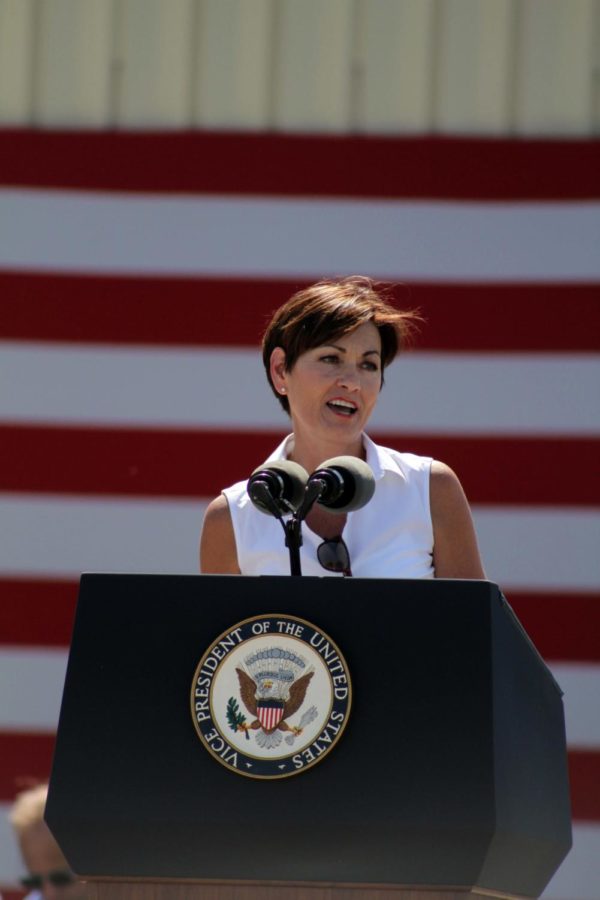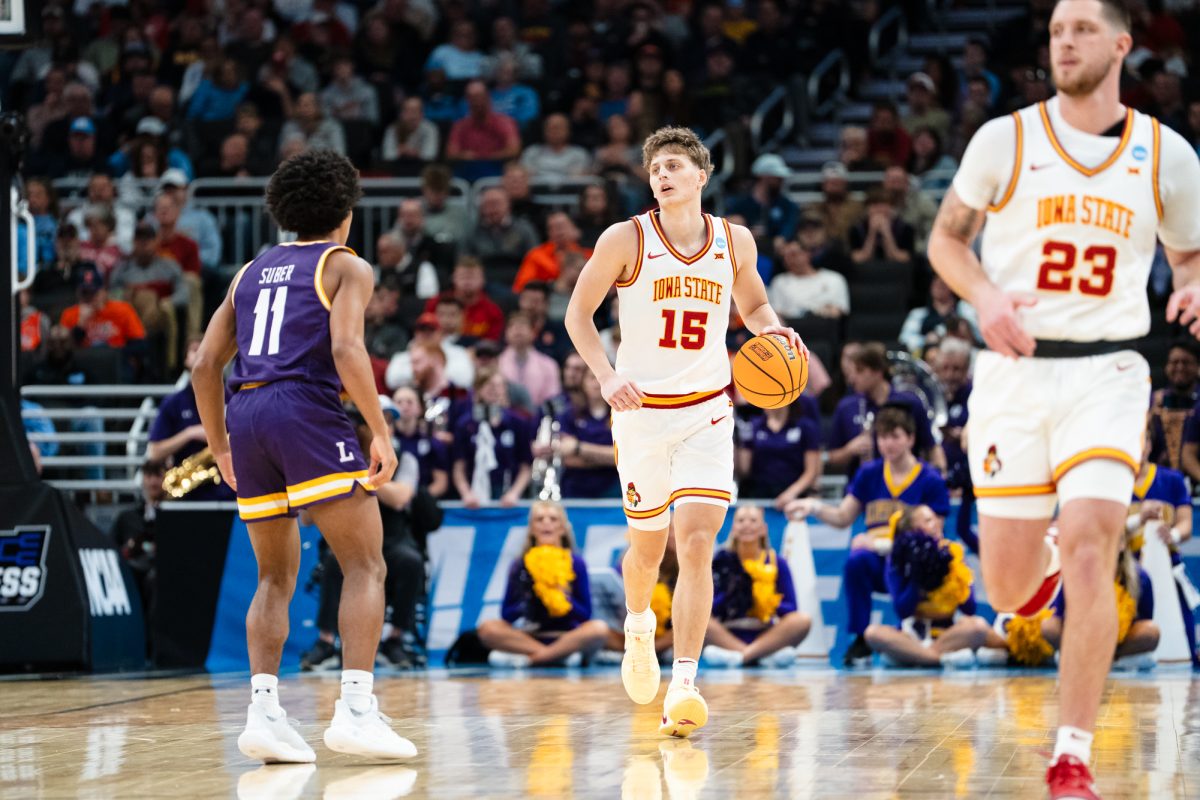- App Content
- App Content / News
- News
- News / Politics And Administration
- News / Politics And Administration / State
Caucus day: Get to know Iowa gubernatorial candidates
February 3, 2018
The 2018 gubernatorial election marks the first election since the longest serving governor in U.S. history, Terry Branstad, left Iowa to become the U.S. ambassador to China.
Monday, two Republicans are up against Branstad’s predecessor, Gov. Kim Reynolds, for the Republican nomination. Eight Democrats are up for the Democratic nomination.
Before caucus day begins, read about the candidates.
Republicans
Kim Reynolds, incumbent
Kim Reynolds is the current governor of Iowa and the first female governor in the state’s history.
She stepped into the position after President Donald Trump selected former-Gov. Terry Branstad to serve as the new ambassador of China.
During her Condition of the State Address, Reynolds said improving water quality is what she wants to see happen first from the legislative session. The governor said the first piece of legislation she wants the chance to sign this year is legislation focused on improving water quality.
Before continuing to the other topics where she wanted to see legislation as well, Reynolds discussed the topic of sexual harassment.
“[Sexual harassment] has been a stain in all facets of life and it must stop,” Reynolds said.
Reynolds said the issue is not a partisan one and must take effort from “each individual man and woman,” and the culture has to change.
Other topics Reynolds emphasized include tax reform, healthcare and K-12 education funding. The governor did not discuss higher education funding.
Reynolds also thanked Congress and President Donald Trump for the recently passed tax reform which Reynolds said will provide Iowans “relief across all brackets.”
There still needs to be tax reform to Iowa’s tax system however, Reynolds said. Specifically, she said she wants to see significant reduction in rates, modernization of the tax code and elimination of federal deductibility.
“This is an opportunity to free us from decisions made in Washington, D.C.,” Reynolds said.
Ron Corbett, Cedar Rapids mayor
Ron Corbett looks to move from mayor to governor by the end of this election cycle with a new “game plan for Iowa.”
At the top of Corbett’s campaign website is a timer titled “How long will it take for Kim Reynolds to reform Iowa’s tax code?”
Corbett lists lowering the marginal tax rate and simplifying the tax code as priorities. He suggested lowering the marginal tax rate from 9 percent to 3 percent by eliminating deductions and credits for those earning above $10,000.
Corbett also lists education as a priority saying the main focus should be “preparing next generations of Iowans for the future.” He suggested creating a state innovation fund, a resource for communities, schools and teachers.
During a visit at the Iowa State Fair, Iowa GOP gubernatorial candidate Ron Corbett said he would eliminate the Board of Regents and replace it with an independent board of trustees for each university.
Corbett—current mayor of Cedar Rapids—made the statement days after Iowa’s public universities revealed five-year tuition proposals pitching 7 percent increases through 2022.
The tuition hikes followed a proposal from Iowa legislators in April that pulled $20 million in funding for education.
Steven Ray, Boone councilman
Steven Ray, Boone councilman, wants to use the “power of positivity” as he runs for governor of Iowa.
On his campaign website, Ray lists his main issues: public employees, public safety, education, veterans, animal welfare, budget and taxes, abortion, gun rights, gay rights and healthcare.
Ray wrote he believes education is the backbone “to a successful society and to a robust economy.”
“I am a strong supporter of STEM (Science, Technology, Engineering and Math). These are critical curriculum to the success of a student’s future,” his website states. “However, the basic models of education such as history, language, writing, social studies and the arts cannot be lost either in their important role in the development of our children as they grow and learn.
Ray wrote he is pro-life after being raised in a Catholic family. As governor, he admits there is little he’d be able to do regarding this issue, but does not support the use of tax dollars to subsidize women’s health clinics that perform abortions.
He believes wealthy abortion advocates can fund these clinics.
Ray also gave his support to keeping gay marriage legal in Iowa, as he has little care for what two consenting adults choose to do in regard to relationships.
“There are a number of conservative LGBT citizens who have long not felt at home in the Republican Party,” Ray said. “It is time that philosophy changes.“
Democrats
Nate Boulton, state senator
Nate Boulton grew up in a union family; as such, his policy is centered around creating a fair and just system for all Iowans. Boulton, a state senator and lawyer focused on labor law, has many plans when it comes to improving the state.
If he were elected, Boulton would set up long-term economic goals that include an immediate increase in the minimum wage, reevaluating the $600 billion the state uses for corporate tax cuts and he would support policy to bring back and strengthen many workers rights. He has also pledged to push for a living wage tied to inflation by 2024.
When it comes to the budget, Boulton argues Iowa’s current leadership hasn’t had the right priorities. As Governor, he would prioritize funding to Iowa’s educational institutions and mental health facilities while also getting rid of the Medicaid privatization that affects 1 in 6 Iowans. He also said Iowa’s public servants need to be fully funded again as to fully staff our facilities and keep Iowa safe.
By 2025, Boulton said he would work to make 50 percent of Iowa’s energy come from renewable sources. He sees this as an economic and climate opportunity for the state to take advantage of.
Cathy Glasson
Cathy Glasson has a “bold progressive plan” for Iowa. On issues regarding healthcare, the minimum wage and unions, Glasson believes she can help Iowans the most.
Glasson says her former experience as a nurse and health care union leader has prepared her to reform Iowa’s healthcare system. She would start by moving away from Iowa’s current privatized Medicaid system to a universal single payer system. As the federal government hasn’t implemented a system like this, Glasson says, “Iowa must be ready to lead the way” to universal healthcare.
Glasson also supports an immediate increase in Iowa’s minimum wage. Her plan is to support legislation day one that would raise the minimum wage to $15 an hour over three years and then tie it to inflation. Glasson uses this policy to distinguish her plan from other candidates saying, “workers can’t wait five or ten years for this to happen.”
Finally, Glasson plans to strengthen unions in the state. She would start by restoring chapter 20, which affected the bargaining rights of 184,000 Iowans. To help unions and their workers, Glasson would also get rid of “right to work” laws in the state.
Fred Hubbell
Fred Hubbell is running a campaign based on the idea of “getting Iowa growing.” He plans to do this by attacking the status-quo saying “politicians have had the wrong priorities for the last seven years.”
To make sure the budget gets funded, Hubbell would slash many of the corporate tax giveaways in the state as well as close tax loopholes. Once this is done, Hubbell would focus on solving the issues related to education funding, Iowan’s health, stagnating wages and access to clean water.
On top of his budget plans, Hubbell wants to make a pro growth state aimed at facilitating increased wages and access to healthcare. He would do this by first funding education “at all levels” and then supporting policies that would increase affordable access to healthcare. Hubbell has also pledged to support policy that would increase access to high speed-internet across the state.
Andy McGuire, former Iowa Democratic Party chairman
Andy McGuire, Democratic gubernatorial candidate, visted Ames in November, and spoke to a group of voters at Stomping Grounds.
She addressed the group with a short introduction about her family of seven children, and talked a little about her college experience.
She also spoke about improving health care.
“I care for every Iowan,” McGuire said. “We have to worry about the people, they are not getting the care they need.”
McGuire said the police is Iowa’s first line of defense for mental health. She said this needs to change. She wants to put money toward community and mental health services across the state.
She shared her passion to restore Planned Parenthood funding as well.
“This is about women being able to control their bodies and their lives,” McGuire said.
Education is also important to McGuire. She said Iowa cannot keep pulling funds for education because it is forcing raises in tuition.
McGuire said it’s not right that minimum wage has not been raised since 2008. She supports $15 an hour minimum wage.
Global warming was another issue discussed.
“It’s a scientific fact. We need to start treating it as such,” McGuire said.
McGuire wants an Iowa with clean air, good public education, affordable health care and good paying jobs and benefits.
Jon Neiderbach
Jon Neiderbach gives two promises which he plans to follow during his campaign and if he is elected governor.
The first promise is he’ll except no more the $500 from any donor in the primary.
“The second is that nobody you can vote for in 2018 will do more to shake up Iowa government to make it more efficient, effective and responsive to the needs of Iowans,” his website states. “I have the passion, knowledge and skills to go after every sacred cow, every outdated policy and every wasteful practice in order to improve government services, save taxpayer money and most importantly make a better life for all Iowans.”
Neiderbach’s campaign website lists some of his goals and values. Among these, he wants to make food, housing and medical care accessible to all Iowans.
He also believes taxes should be progressive, “levied according to the ability to pay.” He also condemned discrimination and bigotry and said these issues should be identified and addressed.
“This is an ambitious list, and it will not be entirely accomplished in one year or even four,” Neiderbach wrote. “But in decades past we were not afraid to be bold and ambitious, indeed we embraced the challenge and knew that the journey to achieve such challenges made us better.”
Neiderbach’s website states he has a combination of experience, knowledge and new ideas with 14 years with the Legislative Fiscal Bureau and 15 years with the Iowa Department of Human Resources.
John Norris
John Norris has described his campaign as the one “for every Iowan.” Norris believes the current system puts some Iowans at a disadvantage so his agenda aims to change that.
Norris wants increased access to affordable health care. One day, Norris says he would end the Medicaid privatization and push policy that would increase funding to our hospitals and programs, especially rural ones.
Norris also has a child centered policy array that he believes will help ensure a quality future for Iowa. This plan includes prioritizing pre-K-12 education as well as expanding early learning programs. To supplement these programs he would also push for “high-quality affordable childcare.”
Norris wants a better focus on Iowa’s agriculture as well. This focus would include policy aimed at helping small and family farmers rather than the large few around the state. Additionally, Norris would support agriculture research to make sure Iowa stays on top nationally.
Norris also wants to improve the water quality around the state through new farming practices that would reduce runoff. As part of this strategy, Norris would support responsible farming practices that would eliminate the use of confined animal feeding operations. (CAFO)
Gary Wells
Gary Wells, 68, is a Cedar Rapids Democrat hoping to become Iowa’s next governor with a focus on helping the middle class.
The Cedar Rapids Gazette reported Wells changed his license plate to “IAGOV18” showing optimism for his chances of being elected. Wells has never held public office.
“I feel for the poor man. I want to help him,” Wells said. “I like the benevolence of the Democratic Party.”
Another priority for Wells is helping businesses by removing regulatory barriers. Other priorities include helping small businesses, farmers, ranchers and manufacturers from Iowa.
Wells’ background is in electronics sales and auto and truck repair and rebuilding.
Ross Wilburn, former Iowa City mayor
Ross Wilburn, former Iowa City mayor, is saying “Let’s be Iowa” as he looks to become Iowa’s next governor.
He called Iowa a leader in education and civil rights, according to his campaign website.
“Despite the current political climate of fear, greed and ignorance, Ross Wilburn has a true vision of what Iowa has always been and what Iowa can be,” the website states. “Ross is entirely committed to leading an Iowa that is just, smart, forward-thinking and truly ‘Iowa nice.'”
Wilburn is currently the diversity officer and associate program director for Community and Economic Development for Iowa State University Extension and Outreach.
He believes all Iowans should have equal access to shelter, nutrition, justice, education and health care.
His priorities are to make Iowa healthy, prosperous and inclusive.
“Developing a strong and sustainable economy from rural to urban communities that provides ample work as well as accessible, affordable education to lift all Iowans,” Wilburn’s website states. “Wilburn will focus on Iowa’s K-12 system as well as its colleges and universities, ensuring education that once again is recognized as the best in the nation as well as strengthening connections with employers to ensure that the next generation of Iowans is prepared for success.”







